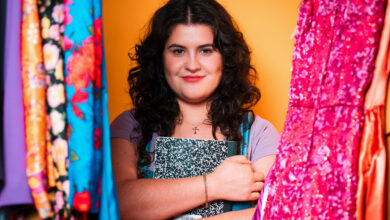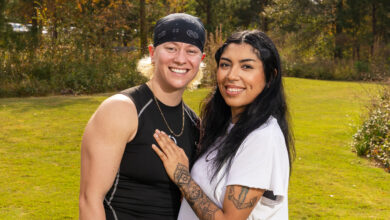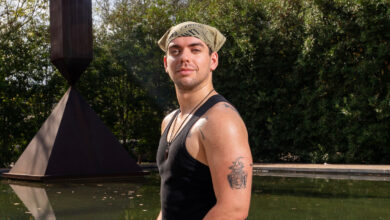Evan Low Makes History as First Asian American to Lead LGBTQ+ Victory Fund
The former mayor and state lawmaker steps up to fight for intersectional representation and equality.

Openly gay activist and politician Evan Low was first endorsed by the LGBTQ+ Victory Fund at the age of 20. Back then, he was a bright-eyed young city-council candidate in California with big dreams, a lot of courage, and no guarantee of success. Although he didn’t win that first race, his defeat didn’t stop him. He ran again, and won. At 23, Low became the youngest openly gay mayor in the United States.
Fast-forward two decades, and the now well-established trailblazer is stepping into a new role. Last February, Low became president and CEO of the LGBTQ+ Victory Fund and Victory Institute, making history again as the first Asian American to lead the crucial organization.
“Victory was there to catch me when I fell—and to push me back in when
I was ready to rise again.” — Evan Low
“My relationship with Victory was such that I was an endorsed candidate when I was 20 years old, running for the first time for City Council,” Low explains. “Victory was there to catch me when I fell, and Victory was also there to push me right back into it when I ran for office in the next cycle and won at 23 years old.”
Low’s notable rise is a testament to persistence, representation, and the power of community investment. His personal story resonates deeply across the intersections of his LGBTQ, Asian American, Native Hawaiian, and Pacific Islander identity, especially during this politically volatile time for those communities.
“There are forces at play that are attempting to legislate us out of existence,” Low warns. “As a result of that, let’s be reminded about the core mission of what our LGBTQ+ Victory Fund is all about, which is to ensure LGBTQ+ representation in elected and appointed office.”
Low, a former California State Assembly member, sees this fraught moment as a convergence of lived experience and organizational purpose. Both he and his predecessor, former Houston Mayor Annise Parker, are examples of the LGBTQ+ Victory Fund’s many successes.
“Certainly, you know the work of Mayor Parker,” Low says. “We both served as mayors. We were both graduates of the Victory Fund David Bohnett Harvard Fellowship Program. We were both endorsed candidates, and both served as CEOs of this organization. In other words, we’ve been beneficiaries and products of the work of Victory, and we hope to give back.”

This CEO job comes with weighty responsibilities, but Low’s vision for the role is simultaneously expansive and energizing. His leadership begins at a time when conservative lawmakers across our country are unflinchingly advancing anti-LGBTQ legislation at a rapid rate. They viciously target some of the most vulnerable populations in our community, including trans youth, drag performers, and gender-affirming care.
“There are laws in multiple states that criminalize our existence,” Low says. “In spite of that, we have members in our Victory Network who are leading by example, running for office despite the dangers that come with it. They’re answering the call for public service as patriotic Americans.”
Beyond supporting candidates in major big-city elections, Low sees Victory’s strongest impacts in numerous small, often overlooked corners of the country. He’s particularly focused on ensuring that candidates in rural areas and smaller municipalities receive the same support as those in more prominent districts.
“Think about that small township of 200 people in which we may have an LGBTQ+ candidate running, but without the same access to resources and a support network centered on how to run as an openly LGBTQ+ person,” emphasizes Low. With support from Victory, these candidates are coached on prioritizing kitchen-table issues for everyday people in addition to receiving guidance on how to show up as their authentic selves and use that to their advantage.
From its earliest candidate trainings to its long-term development programs, Victory is designed to meet leaders where they are and prepare them for tangible growth. “We support them as candidates, we support them while in local office, and then we’ll hopefully be able to have the capacity to support them as they seek higher office as well,” Low adds.

As an Asian American and Pacific Islander (AAPI) member of the LGBTQ community, Low brings an important intersectional lens to his work. In a political climate where racialized rhetoric and anti-Asian violence remain potent threats, Low understands the parallels and shared struggles of multiple human-rights causes and movements.
“In terms of the recent movement to stop AAPI hate, we are actively responding to forces that wish to erase us,” Low points out. “That’s where we are fighting for the basic protections of human dignity that each of us, as Americans and as fellow global citizens, should enjoy. There are legacy proposals targeting both communities, and that’s why intersectionality is important.”
Low also acknowledges the emotional toll of the current climate, and he urges communities to resist the temptation to disengage. Instead, he says, now is the time to connect, organize, and move forward together.
“We are stronger together,” Low reminds us. “We must take the time and effort to check in on one another, because it can be a very, very difficult, stressful, and perilous time to exist.”
Low’s call to action is grounded in hope and possibility. He dreams not just of more LGBTQ and AAPI representation in government, but of transformative leadership that reflects the full, intersectional beauty of America’s diversity.
“I am hopeful that I can play a role in ensuring that Victory, and our Victory Network, meets this moment,” he says. “We will show the best of what our LGBTQ+ community has to offer with inspirational candidates who are transformative statespersons that represent their communities with a deep sense of pride.”
At a time when so much is uncertain, one thing is clear. Evan Low is ready to lead, and he’s undeniably bringing the full weight of his story, identity, and experience with him.
For more info, visit victoryfund.org.










